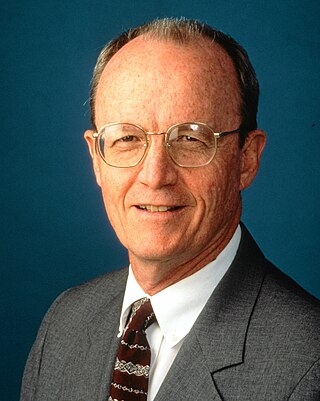Related Research Articles
Optica is a professional society of individuals and companies with an interest in optics and photonics. It publishes journals and organizes conferences and exhibitions. It currently has about 488,000 customers in 183 countries, including nearly 300 companies.
Xi-Cheng Zhang is a Chinese-born American physicist, currently serving as the Parker Givens Chair of Optics at the University of Rochester, and the director of the Institute of Optics. He is also the Chairman of the Board and President of Zomega Terahertz Corporation.
Satoshi Kawata is a scientist based in Japan who is active in nanotechnology, photonics, plasmonics, and other areas of applied physics. He is a Professor of Department of Applied Physics at Osaka University. He is also a Chief Scientist at RIKEN. Kawata was the 2022 president of Optica.
The IEEE Photonics Society, formerly the IEEE Lasers and Electro-Optics Society (LEOS), is a society of the Institute of Electrical and Electronics Engineers (IEEE), focused on the scientific and engineering knowledge about the field of quantum electronics. In the hierarchy of IEEE, the Photonics Society is one of the close to 40 technical societies organized under the IEEE Technical Activities Board.

Anthony Michael Johnson is an American experimental physicist, a professor of physics, and a professor of computer science and electrical engineering at the University of Maryland, Baltimore County (UMBC). He is the director of the Center for Advanced Studies in Photonics Research (CASPR), also situated on campus at UMBC. Since his election to the 2002 term as president of the Optical Society, formerly the Optical Society of America, Johnson has the distinction of being the first and only African-American president to date. Johnson's research interests include the ultrafast photophysics and nonlinear optical properties of bulk, nanostructured, and quantum well semiconductor structures, ultrashort pulse propagation in fibers and high-speed lightwave systems. His research has helped to better understand processes that occur in ultrafast time frames of 1 quadrillionth of a second. Ultrashort pulses of light have been used to address technical and logistical challenges in medicine, telecommunications, homeland security, and have many other applications that enhance contemporary life.

Edward K. Reedy was the director of the Georgia Tech Research Institute (GTRI) from 1998 to 2003, and correspondingly a vice president of the Georgia Institute of Technology. He first joined GTRI in 1970, and specialized in radar system development and electromagnetic scattering. Reedy held a variety of research and leadership positions within the organization, including the head of Research Operations and four years as associate director.
Joseph Brooks is the deputy director of Electronics, Optics, and Systems at Georgia Tech Research Institute. He is the former director of the GTRI Electronic Systems Laboratory (ELSYS).

William L. "Bill" Melvin is the deputy director of Sensors and Intelligent Systems at the Georgia Tech Research Institute. He is a former director of the GTRI Sensors and Electromagnetic Applications Laboratory (SEAL).

Paul F. McManamon is an American scientist who is best known for his work in optics and photonics, as well as sensors, countermeasures, and directed energy.
Guifang Li is a FPCE Professor of Optics, Electrical & Computer Engineering and Physics at University of Central Florida, Orlando, Florida.

Din Ping Tsai is a physicist known for his work in the fields of photonics. He is currently a Distinguished Professor at the National Taiwan University and Director of the Research Center for Applied Sciences, Academia Sinica. He has been President of Taiwan Information Storage Association (TISA) since 2015.
Jelena Vučković is a Serbian-born American professor and Chair of the Department of Electrical Engineering at Stanford University, and a courtesy faculty member in the Department of Applied Physics at Stanford University. Vučković leads the Nanoscale and Quantum Photonics (NQP) Lab, and is a faculty member of the Ginzton Lab, PULSE Institute, SIMES Institute, and Bio-X at Stanford. She was the inaugural director of the Q-FARM initiative. She is a Member of the National Academy of Sciences, and a Fellow of The Optical Society, the American Physical Society and the Institute of Electrical and Electronics Engineers.

Carmiña Londoño emeritus Deputy Division Director of the Electrical Communications and Cybersystems Division at the National Science Foundation. She previously spent 13 years at the National Institute of Standards and Technology, where she led the Global Standards and Information Group. Dr. Londoño spent two terms on the Board of Directors of SPIE, and the SPIE's Director's Award in 2019.
Audrey K. Ellerbee Bowden is an American engineer and Dorothy J. Wingfield Phillips Chancellor's Faculty Fellow at Vanderbilt University, as well as an Associate Professor of Biomedical Engineering and Electrical Engineering. She is a Fellow of Optica, the American Institute for Medical and Biological Engineering and the International Society for Optics and Photonics (SPIE).
Yanne Kouomou Chembo is an electrical engineer and associate professor at the University of Maryland, College Park. His research considers ultra-pure microwaves and Kerr frequency combs. He is a Fellow of The Optical Society and SPIE.
Shouleh Nikzad is an Iranian-American electronic engineer and research scientist at the Jet Propulsion Laboratory. She leads the Advanced Detector Arrays, Systems, and Nanoscience Group. Her research considers ultraviolet and low-energy particle detectors, nanostructure devices and novel spectrometers. Nikzad is a Fellow of the American Physical Society, the National Academy of Inventors and SPIE.
Alexander Luis Gaeta is an American physicist and the David M. Rickey Professor of Applied Physics at Columbia University. He is known for his work on quantum and nonlinear photonics. He is a Fellow of the American Physical Society, Optica, and of the Institute of Electrical and Electronics Engineers.

Igor Meglinski is a scientist studying the imaging of cells and biological tissues utilising polarised light, dynamic light scattering and computational imitation of light propagation within complex tissue-like scattering medium. He is the Professor of Biomedical Engineering and Biophotonics at Aston University and holds the Professor of Opto-Electronics and Biophotonics at Oulu University.

Joseph Rosen is the Benjamin H. Swig Professor in Optoelectronics at the School of Electrical & Computer Engineering of Ben-Gurion University of the Negev, Israel.

Michael Theodore Eismann is an American scientist and researcher working at the Air Force Research Laboratory. He is a former editor of Optical Engineering and a member of the NATO Sensors and Electronics Technology panel. In 2023, Eismann was elevated to fellow membership of the IEEE.
References
- 1 2 3 "Faculty Profile - Gisele Bennett". Georgia Institute of Technology . Retrieved 2010-04-08.
- ↑ "New Leadership: Gisele Bennett Named Director of Electro-Optical Systems Laboratory at Georgia Tech Research Institute". Georgia Institute of Technology. 2005-10-26. Retrieved 2010-04-08.
- ↑ "Alumni: Gisele Welch Bennett". UCF College of Optics and Photonics. Retrieved 2011-11-27.
- 1 2 3 "Meet the Experts: Dr. Gisele Bennett, Ph.D." GTRI Electro-Optical Systems Laboratory. Archived from the original on 2012-05-31. Retrieved 2011-11-27.
- ↑ "GTRI's Gisele Bennett Named Optical Society Fellow". Georgia Tech Research Institute . Retrieved 2014-12-18.
- ↑ "The Optical Society Announces New Editor-in-Chief for Applied Optics". The Optical Society of America . Retrieved 2020-01-07.
- ↑ "OSA Fellows". The Optical Society.